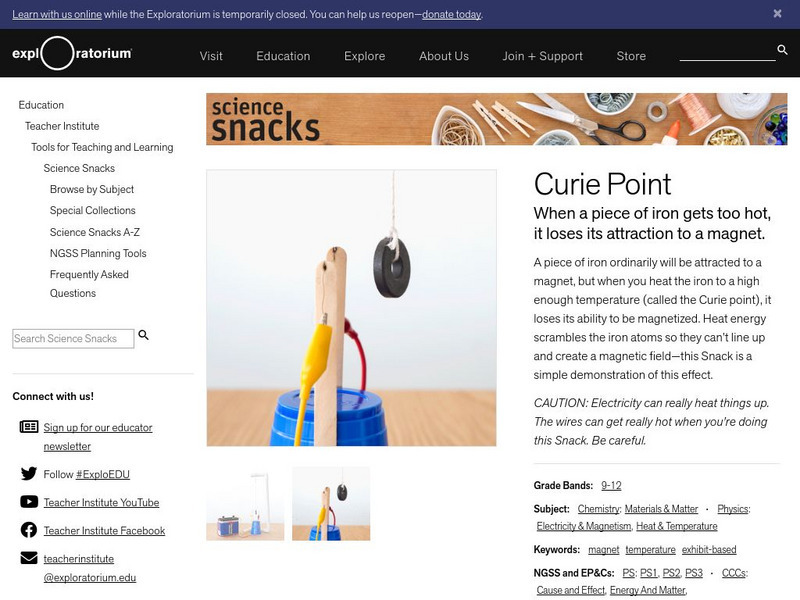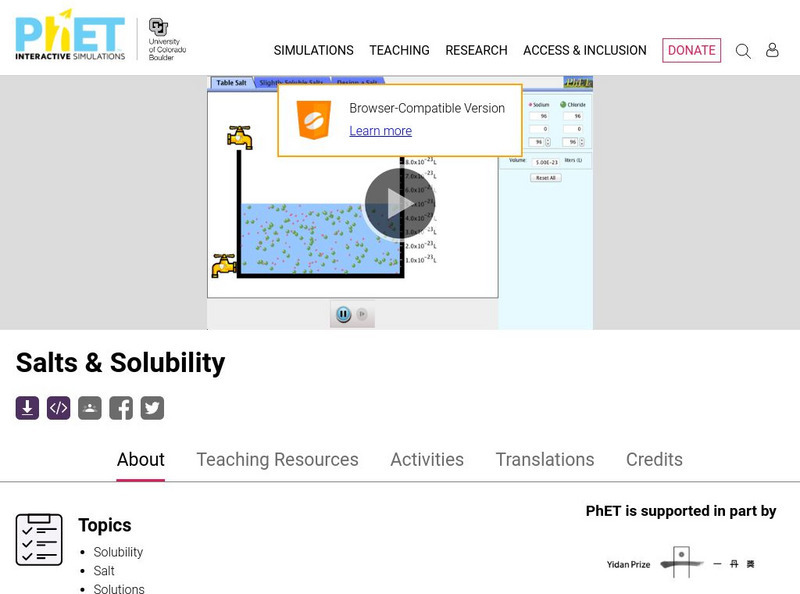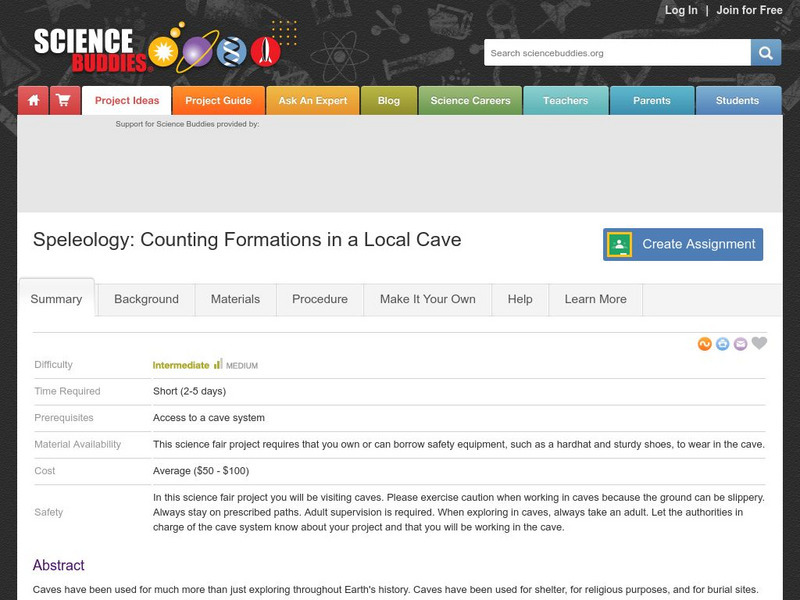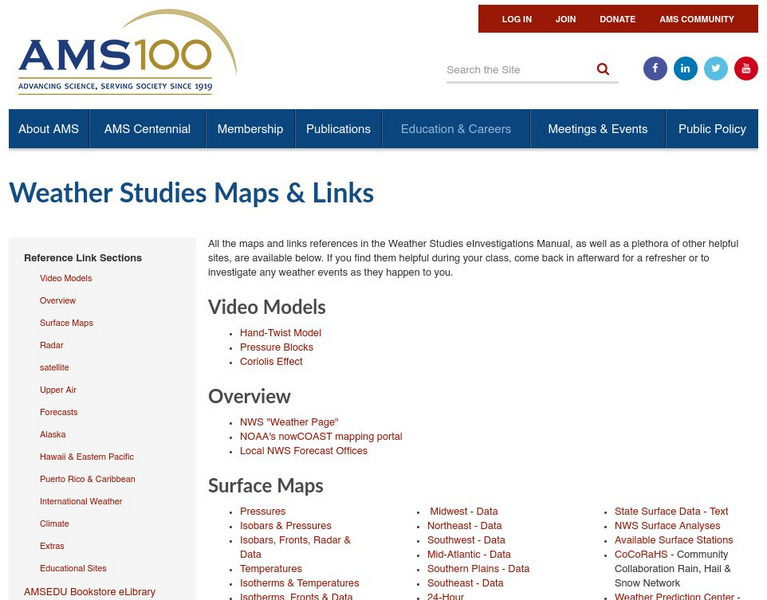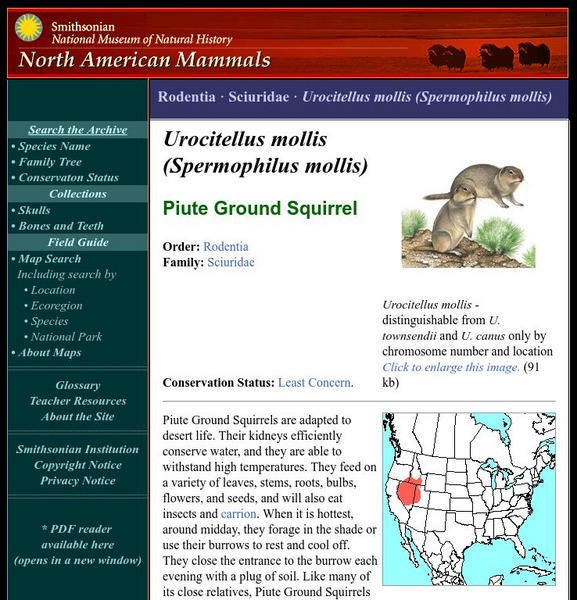Hi, what do you want to do?
Creative Science Centre
Creative Science Centre: Simple High Temperature Light Bulb Thermometer
A very simple electrical resistance thermometer is described that can be built, calibrated and tested in a school laboratory at virtually no cost. With it, flames, focused sunlight and other high temperature sources can be probed. The...
PBS
Pbs Learning Media: Body Breakdowns at High Altitudes
This interactive feature from the NOVA: "Surviving Denali" Web site details the variety of ways the body can fail while climbing a high-altitude peak.
National High Magnetic Field Laboratory
Magnet Academy: Superconductivity 101
An overview of the history, applications and science of superconductivity, including the Meissner effect, BCS theory, Type 1 and Type 2 superconductors and high-temperature superconductivity.
National High Magnetic Field Laboratory
Magnet Academy: Georg Bednorz
J. Georg Bednorz jointly revolutionized superconductivity research with K. Alex Muller by discovering an entirely new class of superconductors, often referred to as high-temperature superconductors. They managed to achieve...
National High Magnetic Field Laboratory
Magnet Academy: John Robert Schrieffer
While still in graduate school, John Robert Schrieffer developed with John Bardeen and Leon Cooper a theoretical explanation of superconductivity that garnered the trio the Nobel Prize in Physics in 1972. The BCS theory (the acronym...
Khan Academy
Khan Academy: Fresh Water Jar
This is a container to hold cold, fresh water made especially for use in the Japanese tea gathering. Its shape reminds us of a wooden bucket used to carry water from a well, but it is made out of porcelain, a glazed ceramic fired at a...
Science Education Resource Center at Carleton College
Serc: Investigating Temperature: Using a Thermometer
In this activity, students will record the high/low temperature daily throughout the school year and observe the change over time (phenology). They will analyze the data monthly and make predictions about the temperature.
National High Magnetic Field Laboratory
Magnet Academy: Mag Lab: Image Furnace
Scientists use image furnaces to grow crystals at very high temperatures. A built-in camera allows them to observe in action a delicate process that is equal parts art and science.
Oak Ridge National Laboratory
Ornl: Teacher's Guide Superconductivity for High School Students
This site from the Human Genome Project provides a large collection of facts and information, demonstrations, experiments and project ideas. Written for teachers but easily adaptable for any type of student work. A good site to check out...
Other
Metamorphic Rocks [Ppt]
Explains the different ways that metamorphic rocks can form. Looks at high temperature, high pressure, and chemically active fluids. Discusses structures created in metamorphic rocks by different forces and the classifications based on...
National High Magnetic Field Laboratory
Magnet Academy: Karl Alexander Muller
In their search for new superconductors, Swiss theoretical physicist Karl Alexander Muller and his young colleague, J. Georg Bednorz, abandoned the metal alloys typically used in superconductivity research in favor of a class of oxides...
Exploratorium
Exploratorium: Science Snacks: Curie Point
Did you know that a piece of iron can lose its magnetism if heated too high? There is a point called the Curie point when iron is heated to a high enough temperature that its iron atoms are scrambled and can't line up to form a magnetic...
Thinkport Education
Thinkport: Writing Explanation Part 1: Claims, Evidence and Reasoning
In this module, students will explore how claims, evidence and reasoning are used to write an effective explanation. Students will read an article that addresses the question of whether climate change is now confirmed after record high...
US Navy
Office of Naval Research: Ocean Water
This highly informative site delves into salinity, pressure, density, temperature acoustics, and optics associated with ocean water. A quick quiz follows the information presented.
University of Colorado
University of Colorado: Ph Et Interactive Simulations: Salts and Solubility
Add different salts to water, then watch them dissolve and achieve a dynamic equilibrium with solid precipitate. Compare the number of ions in solution for highly soluble NaCl to other slightly soluble salts. Relate the charges on ions...
Massachusetts Institute of Technology
Mit: Open Course Ware: Heat Transfer and Thermal Expansion
Students explore heat transfer and thermal expansion. Some topics examined in the activities are thermodynamic cycles, temperature scale, and bimetals. The resource consists of video clips, lecture notes, and exam questions with detailed...
Science Buddies
Science Buddies: Speleology: Counting Formations in a Local Cave
In the past caves have been used for shelter, for religious purposes, and for burial sites. They were even used for food storage before refrigeration, because they are cool and have constant high humidity. Get ready for an adventure as...
Other
American Meteorological Society: Data Streme Atmosphere
This site provides an extensive amount of weather information. Includes current information, forecasting, and historic weather related events. Weather map symbols and terminology explained.
University Corporation for Atmospheric Research
Ucar: Make a Hurricane
The temperature of the sea, moisture in the air, and high winds all play a role in making a hurricane stronger or weaker. Drag the hurricane over the ocean to see what happens.
Scholastic
Scholastic: Dirtmeister's Science Lab: The Air Is There
An experiment to see how the temperature of an object affects how high it bounces. This site contains web links and notes for the teacher.
Concord Consortium
Concord Consortium: Molecular Workbench: Osmotic Pressure
View this simulation to observe the process of smaller particles moving through a semipermeable membrane. Temperature is adjustable. [Must download the simulation to engage in the activity]
Colorado State University
Csu: Model of Basic Otto Cycle
This site from the Colorado State University discusses the Otto cycle of a car engine. Includes a highly mathematical treatment of the efficiency of such engines. Includes a link to a java applet investigating the efficiency of such...
Smithsonian Institution
National Museum of Natural History: American Mammals: Piute Ground Squirrel
Piute Ground Squirrels are adapted to desert life. Their kidneys efficiently conserve water, and they are able to withstand high temperatures. Learn more about the Spermophilus mollis, more commonly known as a Piute Ground Squirrel, in...
Other
Tech Learning: Students Examine Bio Diversity Nov. 2003
Read about the use of data loggers in one high school class. The data loggers were the key to quantifying the relationship between temperature, light, and biodiversity. Although this is relevant to high school science links are provided...














